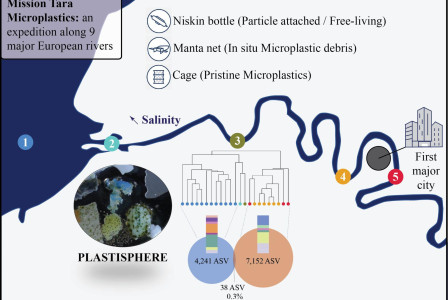News & articles
18 June 2025
Salt barrier blocks harmful bacteria from travelling on microplastics from rivers to sea
News & articles
18 June 2025
Green transition
Login / create an account to be able to react
-
13

A new study finds salinity limits pathogen spread via microplastics from freshwater into marine ecosystems.
Editorial team
European Commission
Topics
Albania
Armenia
Austria
Belgium
Bosnia and Herzegovina
Bulgaria
Croatia
Cyprus
Czechia
Denmark
Estonia
EU-27
Finland
France
Georgia
Germany
Greece
Hungary
Iceland
Ireland
Italy
Kosovo
Latvia
Liechtenstein
Lithuania
Luxembourg
Malta
Moldova
Montenegro
Netherlands
North Macedonia
Norway
Poland
Portugal
Romania
Serbia
Slovakia
Slovenia
Spain
Sweden
Switzerland
Türkiye
Ukraine
Other
EU Institutions
-
Policy type
-
-
Green transition
-
Share
A European study has revealed that water salinity acts as a natural barrier, preventing harmful bacteria from hitching rides on microplastics from rivers into the sea. Researchers sampled microbial communities on plastics in nine major rivers, including the Seine and the Rhine, and found that the bacterial species present in freshwater differed markedly from those in marine environments.
Pathogens such as Aeromonas and Prevotella were found only in river samples, while marine plastics hosted different species like Vibrio, with no overlap observed. The findings suggest that the transition from freshwater to seawater creates strong selective pressure, hindering the long-distance travel of harmful bacteria via microplastics.
The study offers new insights into the so-called 'plastisphere' – the microbial biofilms that form on plastic debris – and underscores the limited risk of certain pathogens reaching marine ecosystems from inland waterways. These findings support ongoing EU efforts to address microplastic pollution through legislation such as REACH, the Marine Strategy Framework Directive, and the Water Framework Directive.
By closing key knowledge gaps, this research helps inform future environmental and health policy on microplastics and water quality – while pointing to the need for broader studies on other microbes and tidal influences.
Comments (0)
See also
Von der Leyen urges Europe to stand united and strengthen its defense in SOTEU 2025
- Categories
- Digital transition EU Policy Green transition
Speech by President von der Leyen at the Global Renewables Summit
- Categories
Commission announces the Critical Chemicals Alliance
- Categories



